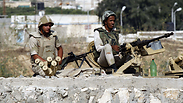
Egyptian soldiers. 'It's difficult to see Hamas pulling out its weapons against them' (archives)
צילום: AFP
The unilateral route: A third option against Hamas
Analysis: Active Egyptian involvement in Gaza Strip after Israeli withdrawal could be even more effective and intimidating than IDF tank barrels in Saja'iyya.
While trying to end the fighting in Gaza, Israel is moving very slowly in the diplomatic field and lacks a sufficient military win.
The important goal of damaging the tunnel system and Hamas' fighting infrastructure will be achieved, and it is a significant achievement, and the rocket threat has suffered too, even if it is still functioning – but these accomplishments are not enough to bring Hamas down on its knees, requesting a diplomatic agreement which will put an end to the fighting.
In order to defeat and deter Hamas, one of these two things is needed: Occupying and cleaning large parts of the Strip of any military ability, or a diplomatic agreement which will leverage the achievements of Operation Protective Edge.
Israel appears to be facing two options: The first is to increase the military pressure on Gaza while making further conquests. The other is to leave the military involvement in its current situation and wait until a diplomatic solution is found.
These two scenarios put Israel in an uncomfortable position. Expanding the ground operation will claim a heavy price, and increasing the concessions to Hamas will intensify its achievements. In such a situation, Israel can develop a third way: The unilateral route.
And this is how it works: In the first stage, Israel completes the destruction of the tunnels and the damage to Hamas' ground abilities. In the second stage, Israel declares that because there is no responsible element on the other side and the dimensions of the humanitarian problem are increasing, it is leaving the Strip unilaterally, as long as an Egyptian-led international inspection force is sent into the Strip to prevent the rocket fire and the resumption of tunnels until an overall solution is found.
Israel, on its part, will allow the opening of the crossings and the advancement of the Marshall Plan for rebuilding the Strip, under Egyptian supervision as well.
The "third way" has a number of clear advantages: First of all, it is a call for a solution "over Hamas' head," which turns Hamas into the main obstacle to a solution of the humanitarian crisis in Gaza. Secondly, Egyptian involvement in the Strip, even partial involvement, could be even more effective than the IDF's involvement. After dealing with the Muslim Brotherhood, all the elements in Gaza re intimidated by Egypt, even more than by the IDF forces.
A third advantage is greater Hamas pressure to remove the Egyptians than if the IDF would stay there.
The main disadvantage is that Egypt has no motivation to volunteer for such a move, unless it is accompanied by a comprehensive and considerable aid package for the Egyptian economy. This is the greatest existential threat faced by Abdel Fattah al-Sisi's government. Such aid should come from the United States and Saudi Arabia.
It's difficult to see Hamas pulling out its weapons against the Egyptians, as it would then really be edging closer to its end.
Such an agreement must be limited in time of course, and the regional and global legitimacy will have to be created by the US, as it bids farewell to the position of mediator and moves to the position of a leader and guide.
The Palestinian legitimacy will be received from Mahmoud Abbas, under the claim that this is the only way which will get Israel out of Gaza and help the Strip's residents.
The chances of fulfilling "the third way" are complicated, but they are not smaller than the chance of getting dragged into a crawling occupation or a weak agreement which will send Israel back into Gaza for another round within a short period of time.
But even if this plan is not accepted, Hamas is as deterred by the threat of a more active Egyptian involvement in the Strip as it is by the IDF's tank barrels in Saja'iyya.
Major-General (res.) Israel Ziv served as head of the Operations Directorate branch in the IDF's General Staff.










